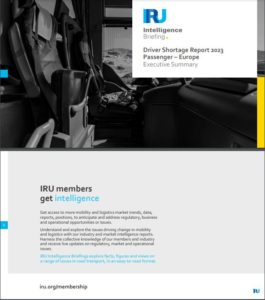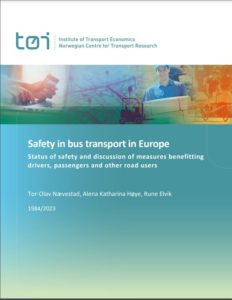Busworld conferences: zero-emissions, driver shortage and more
A series of five European Union conferences, bringing together manufacturers, operators and policy makers were held at Busworld.
The conferences were aimed at making a collective effort to bridge the gap between technological feasibility, economic viability and regulatory demands in the bus industry.
EU Zero Emission Bus Conference
- The EU Zero Emission Bus Conference generated seven pivotal statements, setting the tone for the transition to zero-emission vehicles:
- “The ZEB sector is a leader for the rest of the European energy transition,” as highlighted by Ruud Kempener, cabinet member of EU Energy Commissioner Kadri Simpson.
- Achieving the European Commission’s 2030 target of 100% zero-emission buses necessitates an exponential increase in production.
- Urgent alignment of whole ecosystems towards an integrated energy system, including hydrogen refuelling and smart energy management, is imperative.
- Analytics integration in large fleets offers significant operational cost reduction, enhancing asset availability while reducing energy costs.
- Financial risk diversion for battery electric buses is crucial, with strategies such as selling electricity to third parties playing a vital role.
- Scale and integrated infrastructure support are essential for the implementation of fuel cell buses.
- Busworld showcased long-distance battery electric and fuel cell coaches at the event.

Driver Shortage Roundtable by IRU
A roundtable panel was organised with policy makers, manufacturers and operators to discuss the European bus driver shortage situation based on the presentation of the IRU Driver Shortage Report.
situation based on the presentation of the IRU Driver Shortage Report.
The IRU Driver Shortage Report showed a concerning trend: If no action is taken, the number of unfilled driving positions could increase to 275,000 by 2028, nearly tripling the current 105,000 vacancies. The report also points to a lack of participation from young people (only 3%) and women (just 16%), emphasising the need to attract more young and female drivers to the profession.
Road transport operators and industry representatives agree that legislative solutions can help address these problems. Ongoing negotiations on the EU Driving Licence Directive could potentially lower the minimum age for bus and coach drivers and remove age-related kilometer limitations, and harmonise third-country driver access.
Additionally, derogations in driving and rest time rules for coach transport could reduce driver stress, as the current rules are adjusted to truck driving and are ill-suited to the demands of coach driving.
Driver Safety Seminar
 A new academic report launched at Busworld recommends the development of a new European standard for collision safety in buses. The report, titled “Safety in bus transport in Europe,” was presented by the Institute of Transport Economics. This report, commissioned by Public Transport Norway, provides an overview of safety measures in buses and aims to assist purchasers and authorities in establishing safety requirements for bus contracts and regulations.
A new academic report launched at Busworld recommends the development of a new European standard for collision safety in buses. The report, titled “Safety in bus transport in Europe,” was presented by the Institute of Transport Economics. This report, commissioned by Public Transport Norway, provides an overview of safety measures in buses and aims to assist purchasers and authorities in establishing safety requirements for bus contracts and regulations.
The report’s key recommendation is making several safety measures mandatory in bus transport, such as fleet management systems for smoother driving, safety culture measures, safety management systems, and crash protection for bus drivers.
Currently, these measures are not legally required in bus transport, despite research showing their effectiveness in accident prevention. Additionally, there are no separate safety standards for buses, as they fall under collision standards designed for heavier vehicles. The researchers propose the development of a dedicated European standard for bus collision safety.
EU Digital Mobility Solutions Conference
In collaboration with Ertico ITS Europe, ITxPT, and Espaces Mobilités, the EU Digital Mobility Solutions Conference focused on the future of mobility as a service (MaaS), telematics, smart energy management systems and the implementation of ADAS and autonomous buses:
- MaaS & Multimodality
- The integration of urban and interurban bus services in multimodal mobility systems through digital platforms is key to maintaining the bus industry’s backbone position in urban passenger transport.
- Data collection and analysis are vital for the growth of bus and coach companies, with outsourcing and commercial implementation being viable solutions for companies with limited resources.
- Implementation of Telematics
- Telematics is pivotal for the digitalisation of transport, enabling remote diagnostics, condition monitoring and operational management.
- Challenges include interoperability, ecosystem development and prioritisation of modes.
- Smart Energy Management Systems
- Effective energy management can save over 30% of energy costs in electric bus deployment.
- Inclusive energy management systems are on operators’ wish-list, combining various energy sources, real-time pricing, and predictive energy needs.
- The compatibility of charging software with different infrastructure and vehicles remains a challenge.
- Advanced Driver Assistance and Autonomous Buses
- The deployment of level 4 autonomous buses in public traffic is evolving, with legal issues and 5G network rollout remaining as obstacles.
- Enhanced safety for passengers, drivers and road users is a driving force for the adoption of autonomous buses.
The Future of Coach Tourism in Europe
The Future of Coach Tourism in Europe provided three conclusive statements:
- Low and Zero Emission zones in European cities limit coach access to city centres, while the lack of charging/refuelling infrastructure hampers long-distance zero emission solutions.
- Preparation of dedicated driver and rest time regulations for coach drivers on the European level is welcomed by all stakeholders.
- Group tourism, particularly smaller groups, is on the rise, leading to a diversification in vehicles in terms of size and comfort levels.
Jan Deman, Director of Busworld Foundation, concluded: “As the driving force behind these conferences and in collaboration with many partners, we are committed to further guiding the debate and propelling the European bus industry toward a sustainable and innovative future.”